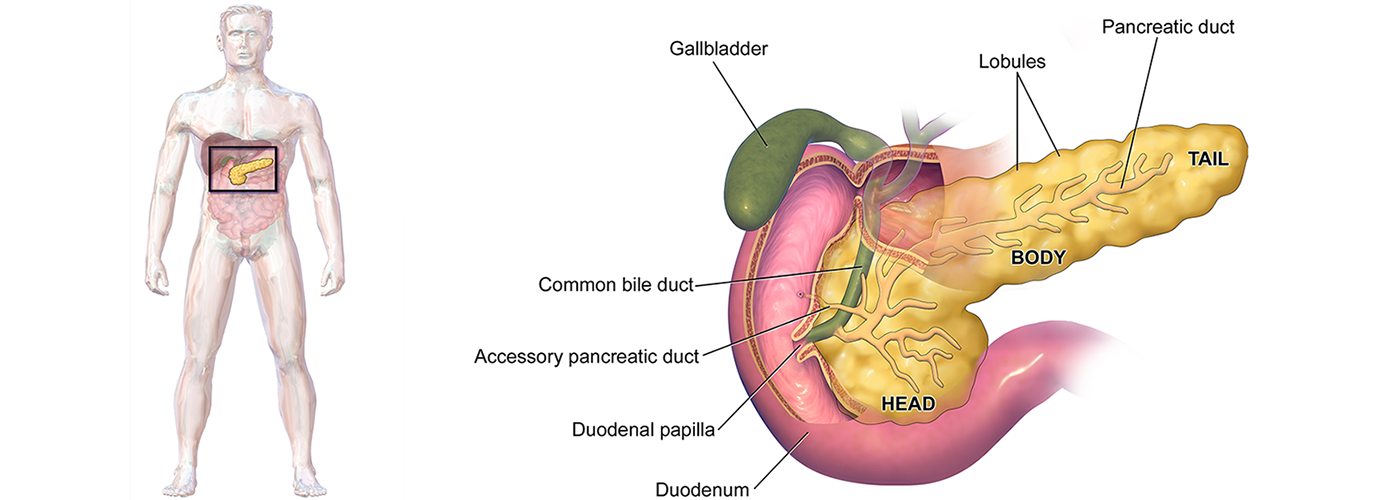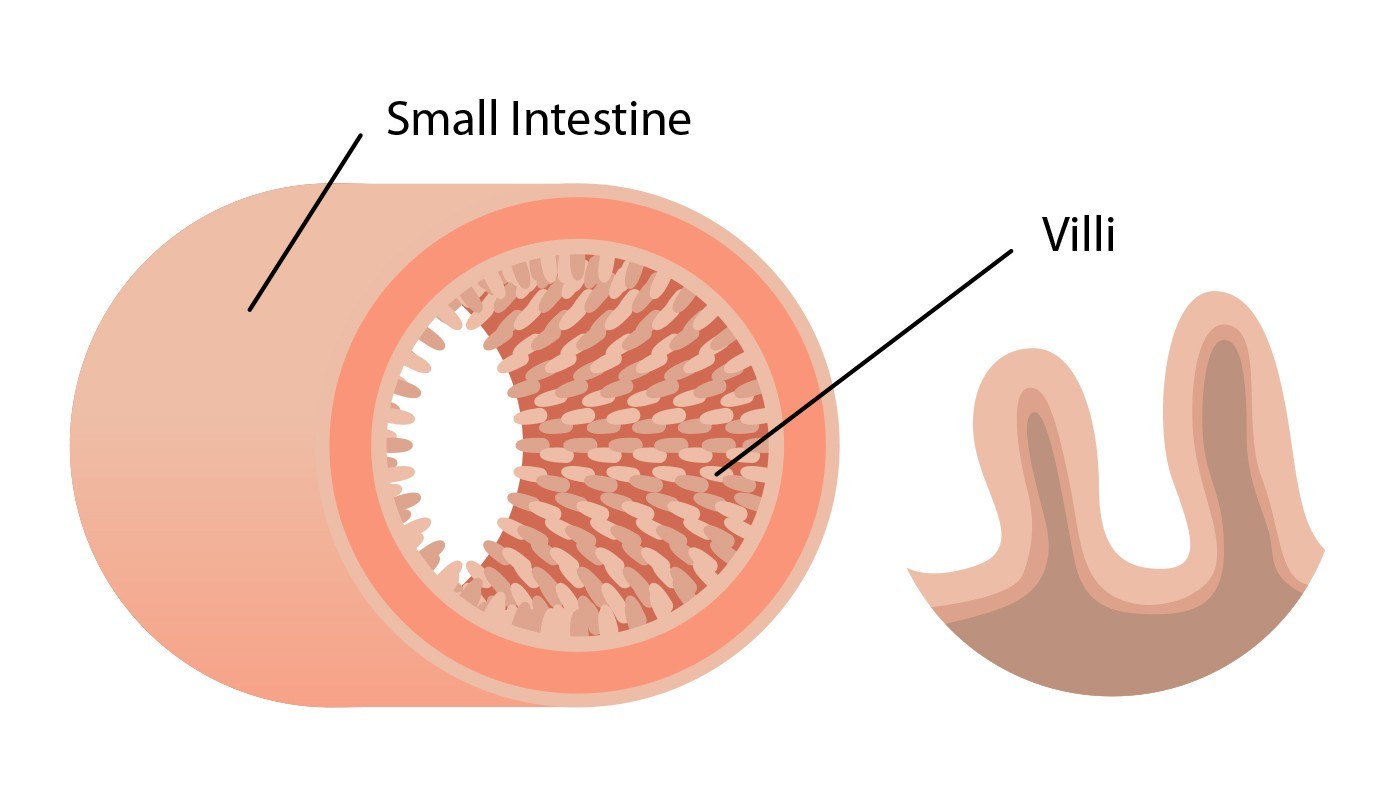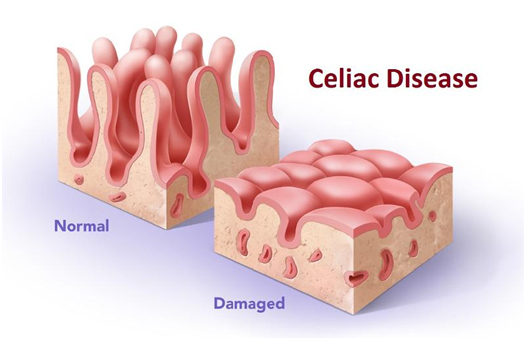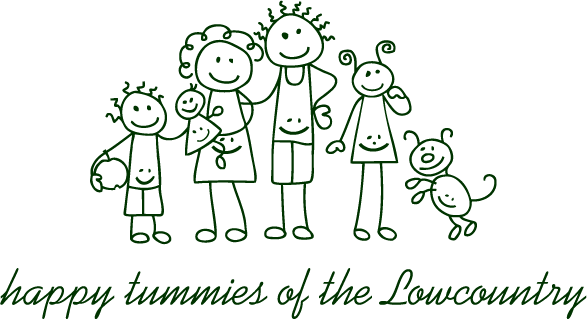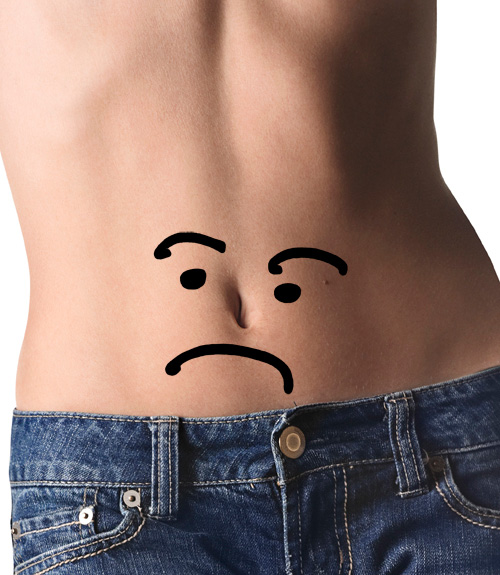
If digestion starts in the brain then what if your brain isn’t thinking about eating?
Stress
If you are stressed out, in a hurry or just plain distracted then the process is impeded from the start. Digestion is a parasympathetic process. That means it happens when we are relaxed and at rest. Stress causes the body to go into a sympathetic state which is our “alert and ready for action” or “survival” mode. If we are being attacked, have to run for our lives or even engaging in an argument with someone, we shift from parasympathetic to the opposite, sympathetic mode, and our bodies react by rallying our resources for the immediate situation. Things like digestion and other parasympathetic processes like reproduction (bowm chica wow wow!!) are put on hold until after the threat is over.
The problem is that in today’s society people spend a whole lot of time in sympathetic mode! Stress is everywhere!! What this means for digestion is really bad. While your brain is busy sending panic messages elsewhere it’s not really focused on telling your salivary glands to release the enzymes to start the chemical breakdown of your food or to initiate hormones to prepare your body for incoming nutrients. Plus if you are in a big hurry chances are you aren’t chewing enough either! So now your carbohydrates missed their main chance at digestion and are getting gulped down into your stomach who also “didn’t get the memo”! So now your stomach acid is not adequate enough to break down this lumpy mass coming at it! Your tummy doesn’t have teeth so it relies on your stomach juices to help break down proteins and also to cleave minerals and other nutrients from whatever they’re bonded to so you can absorb and utilize them. Do you see here how nutrient deficiencies can occur? If your body can’t unlock the nutrients from your food, where are they going to come from?
Gas…Heartburn…Ulcers….Oh my!
What triggers the next phase of digestion? The pH of your stomach contents! Since your stomach acid wasn’t strong enough, now you have this undigested mass of fermenting carbohydrates and putrefying proteins sitting in there for WAAAY too long. Can you say “Heartburn?”. That’s what happens when your stomach contents ferment. They swell up and touch the delicate lower esophageal sphincter (LES)…. and it Burns! Your LES is designed for things to go down. Not up. It’s not tough enough to handle the acidity of stomach acid (weak or strong). So your chyme might NOT be acidic enough to move south… but it IS acidic enough to burn your LES. Do you think it would be wise to take an antacid at this point? Hmmmm… that’s kind of like running head first into a brick wall. On Purpose! Additionally any pathogenic bacteria, viruses, prions or parasites that rode in on your food could very well survive in this alkaline nice warm environment with tons of food and make their new home…in your body. H. Pylori is a bacteria that lives in many people’s stomachs and can be considered a beneficial probiotic but when the stomach pH stays too alkaline for too long it can grow out of control. The medical community now recognizes that most stomach ulcers come from an overgrowth of these bacteria which “corkscrew” into the stomach lining causing harmful irritation and damage.
Duodenum
Eventually, this yucky chyme makes it’s way down into the entrance of your small intestine called the duodenum. In proper function, it should trigger the hormone secretin to tell the pancreas to send bicarbonate to come and neutralize the pH of the chyme. But since the pH is not where it should be, this doesn’t happen and the chyme remains acidic in an area that is not equipped to handle a lot of acid. Do you remember what happened to your LES? Well that’s what’s happening to your small intestine now. This is how duodenal ulcers can occur.
Pancreas
If secretin isn’t present to signal the neutralizing bicarbonate, it also doesn’t send the message for pancreatic enzymes. These enzymes are intended as your second chance at the chemical breakdown of your carbohydrates and proteins. The pancreas also releases pancreatic lipase which helps to break down fats.
Quick Word on Fats
Speaking of fats…. I will not go too in depth about the importance of fats right now but they are vital to every cell in your body! Fats provide us with a long burning source of energy which helps to keep your blood sugar levels nice and smooth. Without fats we could not survive. Look at all the chronic inflammation that is rampant in today’s society. It’s probably due to the fear of fat that has been instilled in us for the last 70 years. You’ve heard of omega 6’s and omega 3’s right??? Those fats are the key ingredients in anti-inflammatory hormones called prostaglandins. Without those fats in your diet, your body cannot make those super important hormones and inflammation can go unregulated.
If you remember from my previous post titled The Happy Tummy, fats also trigger a hormone that signals to your brain that your full! Without the presence of fats in your meal, it can be really easy to eat too much.
Undigested fats wreak havoc inside your body. We’ll cover this in a future post but in short, they put a tremendous strain on your liver, they cause oxidative stress, the ones that don’t get absorbed rancidify in your colon and despite eating fat you can still be left fatty acid deficient. Fatty acid deficiency detrimentally affects how every cell in our bodies function. If our cells are not functioning optimally then neither are we!
Liver / Gallbladder
Remember what your gallbladder does? It’s a pouch that stores bile that your liver worked really hard to make. When fat is detected in your food a hormone is triggered called cholecystokinin or CCK for short. This hormone tells your gallbladder to contract and “squirt” bile into the mix to emulsify or break down fat molecules into fatty acids which can be absorbed into your system. If there is little or no fat in your diet or even the wrong kinds of fats, then CCK doesn’t get triggered and there is no “squirting” from the gallbladder. If your gallbladder doesn’t get to expel its bile often enough, it will stagnate and get sticky. Over time it can even crystalize into gallstones or become infected with bacteria. This is why so many people have their gallbladder removed. It’s like the old adage says “Use it or Lose it”! You definitely don’t want to lose it!! How else are you going to get those essential fatty acids?? Well…your Nutritional Therapist can help in that situation but it’s much better to learn about the importance of dietary fats and which fats are best to consume so you can keep your body parts;)
Small Intestines
The journey through the small intestine is where most nutrient absorption is supposed to happen. But what happens when an undigested acidic glob of sludge moves through? Well…disease! The fingerlike villi and microvilli who are supposed to grab onto to nutrient molecules are now getting slammed and burned by these large particles of acidic undigested food and if this goes on too long eventually they get worn away which greatly reduces the absorptive surface area of your digestive tract and leaves your gut lining irritated and vulnerable. Yes…more nutrient deficiencies.
The gut lining can also weaken to the point that the tight junctions between the cells that hold the integrity of your intestinal walls together can loosen. This is really bad news because now inappropriately digested large food particles can leak in between these junctions and into your bloodstream. The cells that make up your intestines are gatekeepers who chose what is allowed through and what is not allowed into your body. They also signal to your immune system that “we have good stuff coming through! Don’t attack!”. When unaccounted for particles slip through these cracks, your immune system goes on high alert because it didn’t get clearance from your cells and it sees these rogue particles as invaders so it does what it is supposed to do with invaders…it attacks them! Enter Autoimmunity!! Allergies, Food Sensitivities, Celiac Disease…just to name a few…. Your immune system has plenty of important things to do like detect and destroy cancer cells for example. We want it to do THAT! Not beat up our lunch …or ourselves.
This is also a stress to the liver who also has plenty other things to do… like 500 functions that we know of… so we don’t need him fumbling around with undigested food particles. We’re brilliantly designed with these compensatory or “back up functions” to help us in emergency situations but these back up mechanisms aren’t meant to be taken advantage of. When you force your body to compensate, proper function suffers.
Hitchhikers
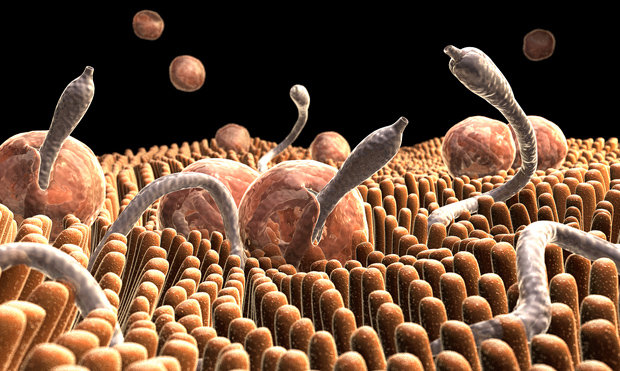
Remember the microbial & parasitic hitchhikers? Well they are really happy right now because they just found a perfect home with tons of food! If your food is not being digested or absorbed properly (especially carbohydrates!) then it sticks around and becomes a feast for microorganisms. Some of these guys can make you really sick but most of these guys are not inherently bad. There are tens of thousands of species that are actually very beneficial and help us with digestion and lot of other things. They even make vitamins!
BUT they are not really supposed to do this in the small intestines. Their place of value is in the colon but they’ll go where there is food! Sometimes they’ll colonize where there is scar tissue or if your ileocecal valve gets stuck open (from poorly digested food) they can back up from your colon into your small intestinal tract. If they start growing and reproducing in your small intestine you could end up with a very uncomfortable problem called Small Intestinal Bacterial Overgrowth or SIBO for short. This is a very complex subject and we’ll talk more about it in a future post but let me just say..YOU DON’T WANT SIBO!!!!!! TRRRRRUUUUUST ME!!!! If you have ever visualized poking a hole in your stomach to let out the most painful, horrible, gas, bloat, pressure that is stuck in you and just won’t go away then you might have experienced SIBO. This problem can lead to malnutrition, constipation, diarrhea, dehydration, damage of the intestinal lining (leaky gut), autoimmunity, chronic fatigue, brain fog, headaches and probably more issues than we know of. There is a lot of information out there pointing the finger at SIBO as the real culprit behind IBS. If that is true then the root of the problem must be where??? Poor Digestion and Poor Digestion of Poor Nutrition!
Colon
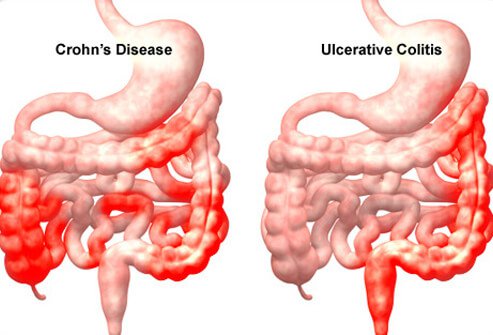
Are you still with me? We’re almost there! The final stage of digestion happens in the colon or large intestine. This is where water and bile normally get recycled, the last of the nutrients from your food are absorbed and a good balanced population of bacteria feed on the remains of your food and make vitamins and butyric acid which nourishes the cells of your colon. But now there is a bunch of rotten leftovers and army of parasitic and dysbiotic mayhem! This disturbs the positive bowel flora which would normally be making those important K and B vitamins and that butyric acid that your colon needs to stay strong and healthy, so you end up with a lot of fermentation/gas, inflammation, diarrhea, constipation, weakened colonic tone, malnourishment and a leaky gut.
Eventually these problems can develop into a diagnosis of Inflammatory Bowel Disease…Diverticulitis, Crohn’s Disease, , Celiac Disease or Ulcerative Colitis. All of these gut problems can be debilitatingly painful, serious medical conditions which could land you straight into the hospital where you might be fed a whole bunch of drugs and antibiotics that may save your life in the short term…BUT ultimately will probably make the problem worse. These types of problems also increase the risk of developing… CANCER.
A Happy Tummy equals a Happy Body!
“Every tiny cell that makes up every tissue that makes up every organ in your body relies on your digestive system to provide it with the nutrients it needs to keep on functioning.” These words have been tattooed on my brain by the Nutritional Therapy Association for life…and for good reason! It is really hard to find a condition that in some way, either directly or indirectly, cannot be linked to digestive malfunction.
I cannot stress enough how important it is to take care of your gut! Chances are… if you improve your digestion and improve the quality of what you eat, many of those annoying symptoms you may be experiencing, will start to resolve themselves.
Relax and Enjoy Your Food!

Remember this. It’s not only about “What” you eat it’s also about “How” you eat! If you made it through my dissertation of a post and only take one piece of information away with you…Please remember to RELAX! Give thanks and appreciation for your meals. Take your time while you eat, chew thoroughly and enjoy your food. Your body will thank you in return!
You can eat the healthiest most nutritious food in the world but if you’re not digesting it properly, you’re not going to reap the benefits.
Post By: Hollie Donelson, NTP
Happy Tummies of The Lowcountry, LLC
Bluffton/Hilton Head, SC
843-227-1042
Please note. I am not a Doctor. The content on this site is not intended as medical advice. Always check with your doctor before starting any type of health or nutritional protocol especially if you are being treated for or have been diagnosed with a medical condition.


